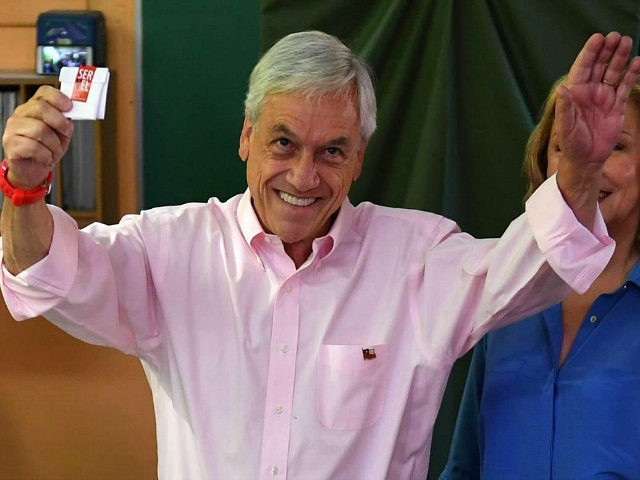Chile has elected former conservative president Sebastián Piñera to another term, rejecting socialist opponent Alejandro Guillier in a result that marks the further collapse of socialist leadership across Latin America.
Piñera, who served as president from 2010 to 2014, won approximately 54.6 percent of the vote compared to Guillier’s 45.4 percent. Turnout was at a rate of 48.5 percent.
“Chile needs agreements rather than confrontations. It needs dialogue, collaboration, because that is how countries progress,” Pińera said. “What unites us is our love for Chile, our firm will to deliver the best of ourselves, so that we can have a fuller life.”
Chile is known for having one of the strongest and most developed economies in Latin America, although economic growth has recently fallen to a sluggish 1.4 percent as a result of a fall in the global prices of commodities.
Piñera’s campaign was primarily built on revitalizing the Chilean economy through a series of economic reforms that included tax cuts for businesses, while Guillier promised to expand social programs and increase taxes on the rich.
In his concession speech, Guillier congratulated his opponent on his “impeccable and solid triumph,” adding: “We have suffered a hard defeat but it’s when you lose that you learn the most.”
The election marks another shift to the right in Latin America with the election of a number of right-wing leaders such as Brazil’s Michel Temer, Peru’s Pedro Pablo Kuczynski, and Argentina’s Mauricio Macri.
In the 2000s, Latin America became notorious for its “pink tide” with the election of numerous populist hard-left presidents such as Venezuela’s Hugo Chávez, Argentina’s Cristina Fernandez de Kirchner, Brazil’s Dilma Rousseff, and Bolivia’s Evo Morales, although that trend now appears to be quickly rescinding.
Piñera even referenced the current economic and humanitarian crisis in Venezuela as part of his campaign, warning that the country could become “Chilezuela.” Since leaving office in 2012, Piñera became a prominent supporter of the Venezuelan opposition, regularly warning of the risks of a left-wing populism.
“Without a doubt, Chile is not Venezuela, but beware, because the future of countries is unwritten, and their progress is not guaranteed,” he said.
Piñera will succeed socialist president Michelle Bachelet, who despite an early wave of popularity, saw her approval rating sink to just 24 percent over a corruption scandal involving her daughter-in-law and her failure to effectively deal with a wildfires crisis that ravaged the country’s rural landscape and killed scores of people.
Her moves to legalize abortion and same-sex marriage also angered large swathes of the country’s strong Catholic population.
In a phone call to Bachelet, who has now served two full terms in office, Piñera said: “I have never had the slightest doubt that both you and I want the best for Chile.”
Follow Ben Kew on Facebook, on Twitter at @ben_kew, or email him at bkew@breitbart.com.

COMMENTS
Please let us know if you're having issues with commenting.